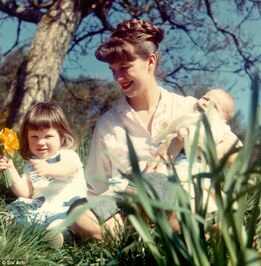|
When the speaker of the poem in Plath's, "Medallion," picks up the dead snake and looks it in the eye, everything changes. Plath's view of death changes, her view of nature changes, and -- most importantly -- her poetry changes. It would never again be the same. I know this seems like a very strong statement, but I can back it up. First of all, Plath's gesture in taking the dead snake in hand is more than a Freudian castration fantasy and it's more than a throwback to the Biblical rebellion of "Sonnet to Satan." What she's doing in this poem is more, even, than striking a blow for Mother Earth and ecology. Although she's definitely doing that. To fully understand what's going on in the poem, we need to tap deeply into a single word: the title. The first thing to note is that it's a single word. It suggests unity and wholeness. Like the roundness of a medal. I wonder if you are aware that the word "medallion" applies to more than a medal, or a carving in a wall. It actually can also mean a small serving of meat. And this is the aspect of the word that's really important here. Plath's husband, Ted Hughes, was very well known as a "muscular" poet, centered on nature, who often assumed the perspective of predators, like jaguars, gar, or foxes. He was an alpha male of a guy. So let's tie that to another quick biographical insight into this poem. It was written at a writer's retreat called Yaddo that was only for the cream of the crop -- and Plath was there as a guest of her husband, who was actually in residence there as a poet. She was a tag-along. A small serving of meat. Now deeply consider this as you read the poem again (click Plath's picture above). The setting is Yaddo. Plath is alone. She finds a dead snake by the gate and picks it up, bonds with it, and in doing so not only gains a "medal" of individuation and poetic purpose, but also learns something about the nature of predation and the heart of nature itself that her nature-poet husband seems to have missed.... These lines are a description of the beginning of what she learned: Over my hand I hung him. His little vermilion eye Ignited with a glassed flame As I turned him in the light; It is at this precise moment that her unique voice and purpose as a poet is truly initiated. But to gain it she has to see through death. Her poetic voice is dependent on seeing through death. It is also at this point when the premonition of her marriage break-up (as shown in "A Winter Ship") starts to prove itself true. But more on all this next Monday*, as I finish up my analysis of this incredible poem. Yes! The poems is worth three blog posts! It's probably worth an entire book! Poem tally as of today: 7-30-23: Poems Written: 325 Poetry Submissions: 51 Rejections: 24 (14 tiered) Acceptances: 0 Poem written today: "Skull Money" Want a little help polishing or editing your poems? Contact me: [email protected] OR use the links below. * If you're feeling really ambitious, please look up the Melissae, find all the stuff about bees and seeing past the veil of death through poetry, and consider how this all relates to SP, synchronistically. Categories All
0 Comments
Leave a Reply. |

